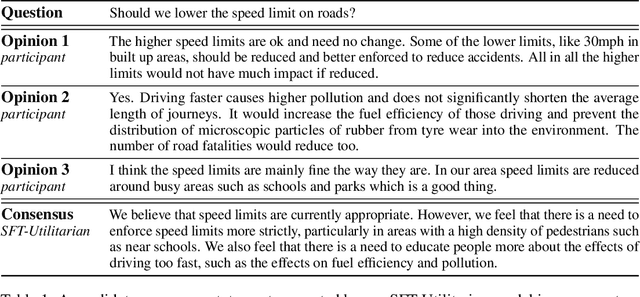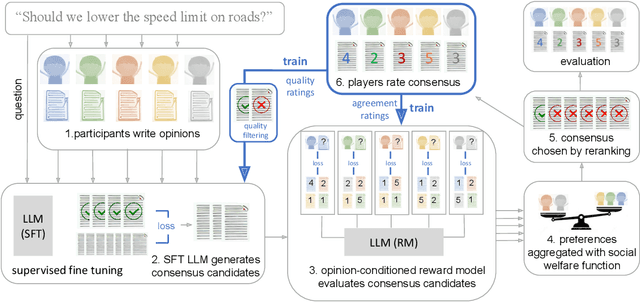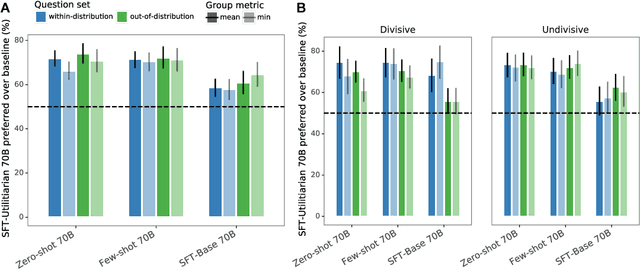Martin J. Chadwick
Fine-tuning language models to find agreement among humans with diverse preferences
Nov 28, 2022



Abstract:Recent work in large language modeling (LLMs) has used fine-tuning to align outputs with the preferences of a prototypical user. This work assumes that human preferences are static and homogeneous across individuals, so that aligning to a a single "generic" user will confer more general alignment. Here, we embrace the heterogeneity of human preferences to consider a different challenge: how might a machine help people with diverse views find agreement? We fine-tune a 70 billion parameter LLM to generate statements that maximize the expected approval for a group of people with potentially diverse opinions. Human participants provide written opinions on thousands of questions touching on moral and political issues (e.g., "should we raise taxes on the rich?"), and rate the LLM's generated candidate consensus statements for agreement and quality. A reward model is then trained to predict individual preferences, enabling it to quantify and rank consensus statements in terms of their appeal to the overall group, defined according to different aggregation (social welfare) functions. The model produces consensus statements that are preferred by human users over those from prompted LLMs (>70%) and significantly outperforms a tight fine-tuned baseline that lacks the final ranking step. Further, our best model's consensus statements are preferred over the best human-generated opinions (>65%). We find that when we silently constructed consensus statements from only a subset of group members, those who were excluded were more likely to dissent, revealing the sensitivity of the consensus to individual contributions. These results highlight the potential to use LLMs to help groups of humans align their values with one another.
Deep reinforcement learning models the emergent dynamics of human cooperation
Mar 08, 2021


Abstract:Collective action demands that individuals efficiently coordinate how much, where, and when to cooperate. Laboratory experiments have extensively explored the first part of this process, demonstrating that a variety of social-cognitive mechanisms influence how much individuals choose to invest in group efforts. However, experimental research has been unable to shed light on how social cognitive mechanisms contribute to the where and when of collective action. We leverage multi-agent deep reinforcement learning to model how a social-cognitive mechanism--specifically, the intrinsic motivation to achieve a good reputation--steers group behavior toward specific spatial and temporal strategies for collective action in a social dilemma. We also collect behavioral data from groups of human participants challenged with the same dilemma. The model accurately predicts spatial and temporal patterns of group behavior: in this public goods dilemma, the intrinsic motivation for reputation catalyzes the development of a non-territorial, turn-taking strategy to coordinate collective action.
MEMO: A Deep Network for Flexible Combination of Episodic Memories
Jan 29, 2020



Abstract:Recent research developing neural network architectures with external memory have often used the benchmark bAbI question and answering dataset which provides a challenging number of tasks requiring reasoning. Here we employed a classic associative inference task from the memory-based reasoning neuroscience literature in order to more carefully probe the reasoning capacity of existing memory-augmented architectures. This task is thought to capture the essence of reasoning -- the appreciation of distant relationships among elements distributed across multiple facts or memories. Surprisingly, we found that current architectures struggle to reason over long distance associations. Similar results were obtained on a more complex task involving finding the shortest path between nodes in a path. We therefore developed MEMO, an architecture endowed with the capacity to reason over longer distances. This was accomplished with the addition of two novel components. First, it introduces a separation between memories (facts) stored in external memory and the items that comprise these facts in external memory. Second, it makes use of an adaptive retrieval mechanism, allowing a variable number of "memory hops" before the answer is produced. MEMO is capable of solving our novel reasoning tasks, as well as match state of the art results in bAbI.
 Add to Chrome
Add to Chrome Add to Firefox
Add to Firefox Add to Edge
Add to Edge